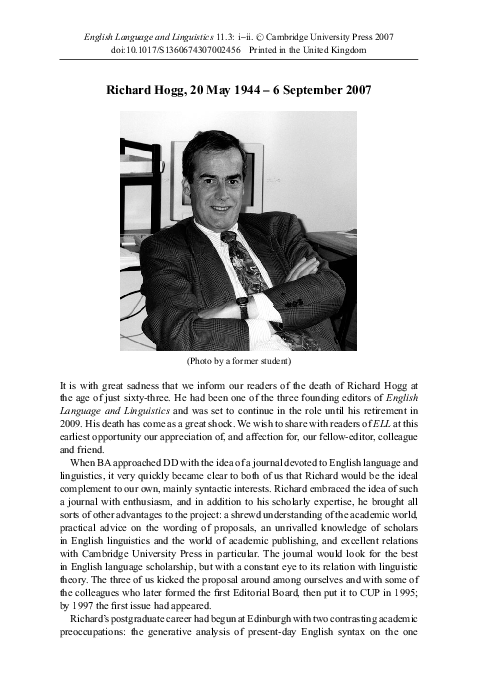C Cambridge University Press 2007
English Language and Linguistics 11.3: i–ii. �
doi:10.1017/S1360674307002456 Printed in the United Kingdom
Richard Hogg, 20 May 1944 – 6 September 2007
(Photo by a former student)
It is with great sadness that we inform our readers of the death of Richard Hogg at
the age of just sixty-three. He had been one of the three founding editors of English
Language and Linguistics and was set to continue in the role until his retirement in
2009. His death has come as a great shock. We wish to share with readers of ELL at this
earliest opportunity our appreciation of, and affection for, our fellow-editor, colleague
and friend.
When BA approached DD with the idea of a journal devoted to English language and
linguistics, it very quickly became clear to both of us that Richard would be the ideal
complement to our own, mainly syntactic interests. Richard embraced the idea of such
a journal with enthusiasm, and in addition to his scholarly expertise, he brought all
sorts of other advantages to the project: a shrewd understanding of the academic world,
practical advice on the wording of proposals, an unrivalled knowledge of scholars
in English linguistics and the world of academic publishing, and excellent relations
with Cambridge University Press in particular. The journal would look for the best
in English language scholarship, but with a constant eye to its relation with linguistic
theory. The three of us kicked the proposal around among ourselves and with some of
the colleagues who later formed the first Editorial Board, then put it to CUP in 1995;
by 1997 the first issue had appeared.
Richard’s postgraduate career had begun at Edinburgh with two contrasting academic
preoccupations: the generative analysis of present-day English syntax on the one
�ii
RICHARD HOGG
hand (his PhD topic), and Middle English dialectology on the other (his research
post). He went on to hold lectureships in Amsterdam and then Lancaster, before
arriving in Manchester as the surprisingly young Smith Professor of English Language
and Medieval Literature in 1980 (where DD was already a junior member of the
department). Not that DD recalls him ever teaching medieval literature: it was the first
conjunct in his job title that counted for Richard, and it was rarely possible to get
him to do anything that he didn’t want to. By the mid-1990s his primary academic
research seemed to lie in Old English morphology and phonology, and also in English
phonology generally – though the Cambridge history of the English language (1992–
2001), which he initiated as general editor, relied on a wider range of contacts and
interests. Possibly through his own studies of Old English and his earlier work on what
would become the Linguistic atlas of late mediaeval English, he was also becoming
more interested in English dialectology. Phonology, morphology, dialectology: those
were the areas that Richard concentrated on in his ELL editing, as we had decided
early on to divide up submissions according to our own specialisms (a policy only
made publicly explicit this year). In recent years Richard developed his interests in the
history of English grammar writing and in the attitudes to language both of ordinary
speakers and of scholars, and thus in aspects of the history of linguistics and philology,
treated as cultural history. He was close to the completion of two books, the second
and last part of his Grammar of Old English and a history of English dialectology, and
he was planning a joint monograph with his newest colleague, Nuria Yáñez-Bouza, on
the history of prescriptivism in England.
Richard’s enthusiasm for the English language was tremendously infectious. BA
recalls arriving for a social event at the Manchester Museum during the DELS
conference in 2006 to find Richard standing at the foot of a copy of the Ruthwell
Cross, animatedly explaining its significance to a number of delighted colleagues
and students. His passion for English also shone through in postings on his English
language blog, which he started in October 2006 in an ‘attempt to expose some of the
many fallacies about English’.
As a colleague, Richard was good fun, always ready for conversation and gossip,
down-to-earth and unpretentious, relaxed and cheerful (if occasionally provoked to
irascibility in meetings), supportive, helpful. Although he wore it lightly, he was always
a thoughtful man, and time and again his judgement was proved sound. Both as an
intellectual and as an organizer he was innovative and ingenious, often reflected in his
body language as he argued his way through a tortuous sequence of ideas. As a teacher,
too, he must have been good fun; certainly his students adored him.
This brief appreciation is not an obituary: it will need more time and space to
document his life and to list properly his many publications, achievements and interests.
A Festschrift was already secretly on the way. Sadly, that will now have to be a memorial
volume. And already there are plans for a prize in his name. For now, though, we wish
to express our thankfulness for having been able to work so amiably and for so long
with Richard, and our great sadness at his passing.
David Denison and Bas Aarts, September 2007
�

 Bas Aarts
Bas Aarts